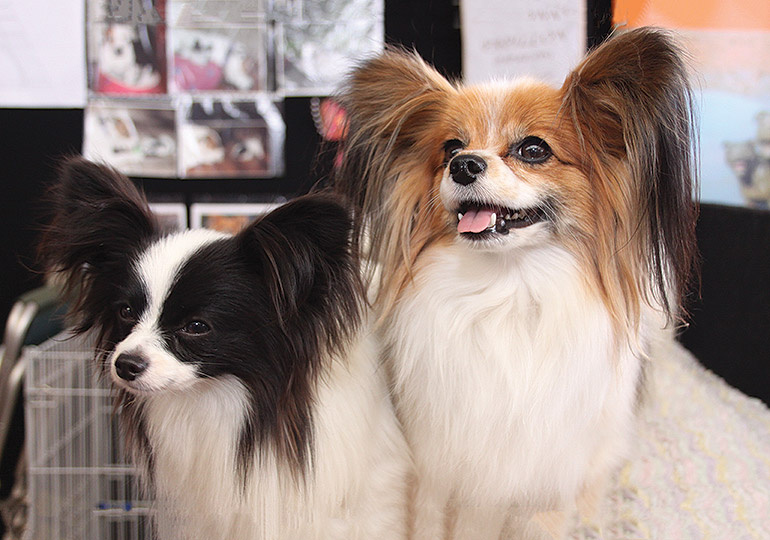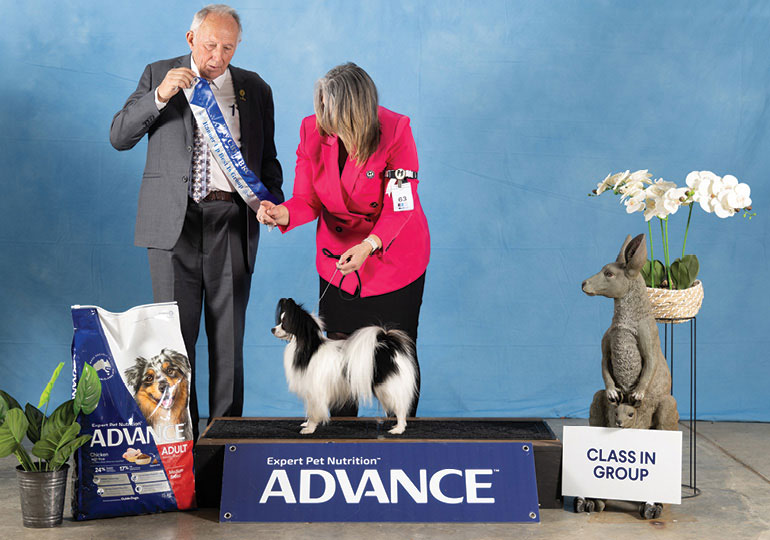Breeds
Papillon

GROUP 1 - TOYS
History
Previously known as the Dwarf Spaniel, Royal Toy Spaniel, Continental Toy Spaniel, Epagneul Nain, Little Squirrel Dog and Belgian Toy Spaniel, the Papillon’s country of origin is uncertain.
Theories regarding the breed’s ancestry suggest the Papillon is the lineal descendant of an extinct small breed, an Italian Toy Spaniel.
By the Renaissance, Papillons had become continental court favourites. This little dog has been breeding true to type for seven hundred years, appearing in European art as early as the 1300s.
Madame Pompadour and Marie Antoinette of France, Queen Sophia Dorothea of Germany and Queen Ann of Austria are among the aristocratic ladies who owned Papillons. Royal men also doted on these elegant little dogs: France’s King Henry III is said to have carried his to court in a basket.
Characteristics
This dainty Toy breed should have an attractive head, an alert bearing and an intelligent and lively expression. The Papillon is a friendly, elegant dog with fine bone structure. It is distinguished from other breeds by its beautiful butterfly-like ears. The breed has the build of a normal small dog and should be balanced in all respects but one: its ears should be large, obliquely carried and heavily fringed.
Temperament
As a happy, intelligent and alert breed, the Papillon performs very well in Agility competitions as well as Obedience. But it is just as happy at home on the lounge, as long as it has some simple exercise such as a run in the garden or a walk with its owner. The Papillon is even tempered, but perhaps isn’t suitable for young children due to its delicate bone structure.
Appearance
The Papillon’s ears are unquestionably the outstanding feature of the breed, as indicated by its name, Papillon – French for butterfly. The ears should be large and mobile with rounded tips. They should be heavily fringed, set towards the back of the head far enough apart to show the slightly rounded shape of the skull.
The ears should be either competely erect – carried obliquely like the spread wings of a butterfly – or completely dropped. Papillons with dropped ears are a type known as the Phalene.
The Papillon’s eyes are of medium size, rounded, dark in colour, placed rather low in the head and should not bulge. The breed’s expression is extremely sweet and quite mischievous.
The breed’s coat is white with patches that may be any colour except liver. A tricolour must be black and white with tan spots over the eyes and tan inside the ears, under the tail and on the cheeks.
The head marking should be a clearly defined blaze.
Maintenance
The silky-textured, single coat is not prone to matting. A thorough brush twice a week and, if the dog is kept inside, a bath once a fortnight is adequate to keep the coat in tip top order.
Health
The Papillon is a healthy breed with very few major health problems. Patella luxation is known within the breed, as is Progressive Retinal Atrophy. Responsible breeders are aware of these problems and work to eliminate them from their breeding stock.
Suitability
The Papillon is a people-oriented breed which, coupled with its lively intelligence and engaging nature, makes it suitable for a wide range of activities and lifestyles. It is a wonderful companion dog that will want to be involved in everything you do.
The breed is engaged in a diverse range of activities, including Obedience and Agility, and of course it also makes a wonderful lap dog.
Words: Jean Rimmer on behalf of the Papillon Club of NSW
Image: Kerry Christofi
In Conclusion
Now you know a little about the Papillon, you may think that this is the dog for you. Before you make a decision, please make contact with the breed club or your State controlling body for purebred dogs. They will be able to give you information about available puppies and also suggest dog shows where you can see the breed and speak to breeders. In this way you will gain a better perspective of the Papillon and its needs, and whether this breed would suit your lifestyle.
Breeders





